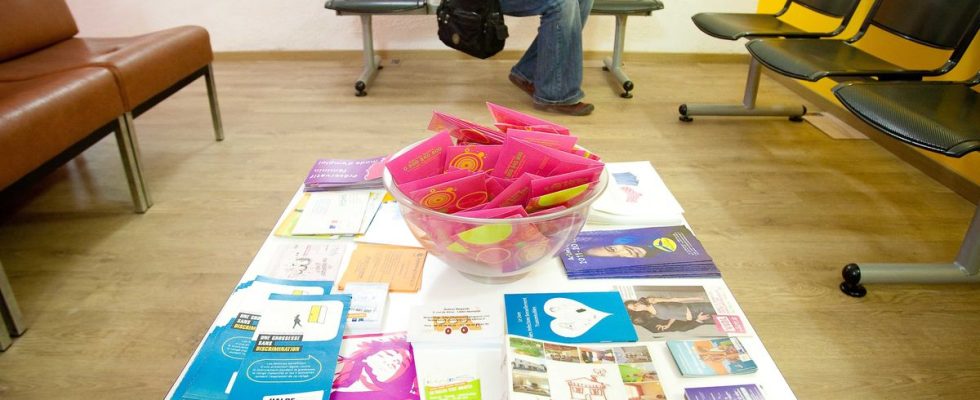In 2022, in France, family planning advised, accompanied or simply informed more than 400,000 people. Women, of course, supported in the choice of contraception, or in an abortion (voluntary termination of pregnancy). But also middle and high school students, made aware of sexuality or discrimination. If this old movement, created in 1960, has established itself as a privileged interlocutor for questions of contraception, abortion and awakening to sexuality, the health of its departmental branches is precarious. On the occasion of World Abortion Rights Day, 20 minutes questioned the financial fragility of Family Planning.
In Montpellier (Hérault), Family Planning is even in a particularly worrying situation. A few months ago, the association was missing 160,000 euros. She managed to pay off half of her debt, thanks to donations, and an effort from state services, the Regional Health Agency, the department and the town hall. But the Hérault Family Planning bank account remains in the red: 80,000 euros are missing. Its budget has already experienced turmoil, but never such an abysmal deficit. The fault lies in financial aid which does not always follow the boom in requests experienced by the association.
A “discrepancy” between needs on the ground and financial support
“Demand is increasingly strong,” explains Maïté Stumpf, project manager at Hérault Family Planning. Particularly, unfortunately, because precariousness is increasing. And in middle and high schools, activities are developing, because the needs are increasing. But funding does not always follow. »
Sometimes, Hérault Family Planning, whose actions have benefited 23,500 people in 2022, is forced to “work for free”, without knowing if its interventions will be financed as they should. “In schools, our activities highlight cases of violence, harassment, etc.,” continues Maïté Stumpf. When we are faced with these young people, we cannot do a two-hour animation, and then “Hello!”. » There is a “discrepancy”, she deplores, between “the needs on the ground” and the financial support granted to Family Planning.
In recent months, the association, which has become highly professional to offer a much better quality welcome to its beneficiaries, has had to resolve to let go of three employees out of the approximately fifteen employees it employed. This was not enough to rebalance its budget. “But these employees… They had work! », points out Maïté Stumpf. In Hérault, the call for donations from Family Planning is still open on the Helloasso platform (here). The association also organizes a show, this Wednesday (8 p.m.), at the Maison des choirs, in Montpellier. The entire proceeds will be donated to the association.
“We remain in worrying financial situations”
But Hérault Family Planning is not the only one experiencing difficulties. In Gironde, too, the association experienced a significant deficit, around 40,000 euros, in 2021. Donations, as well as support from its partners, had made it possible to bring the antenna out of the red. But its financial health remains fragile. “Last year, we were almost in balance,” says Michèle Joliat, treasurer since June at Family Planning in Bordeaux. We had a deficit of around 7,000 euros. » An exceptional donation of 10,000 euros, awarded by a generous donor, allowed the association, which supported more than 27,000 people last year, to get its head above water .
But “we remain in worrying financial situations,” assures Michèle Joliat. It’s very fragile. And we honestly don’t have any expenses we can cut back on. However, we spend very little, we are very careful. We are known, identified, we have a real role to play, and yet we are faced with financial difficulties. This may seem a bit paradoxical. »
Heavy administrative paperwork for Family Planning
To receive help, and to try to obtain new subsidies, like other branches in France, the Family Planning of Gironde, which employs ten people (for 6.5 full-time equivalents), is forced to constantly fill out new files and respond to calls for tenders. But “we need specific personnel” to work on these tasks, explains Michèle Joliat. “And we are not able to hire these staff full time.” This administrative paperwork, inherent to all associations, is a real gas factory.
Delphine Poivert, responsible for development at Family Planning of Haute-Garonne, in Toulouse, would be in favor of larger allocations. But also to a simplification of administrative procedures. “Management has become very complicated,” confides Delphine Poivert. Every year, we are obliged to re-apply [les financeurs], we are in doubt, we never know how much we will get. And we must constantly adapt to new configurations, new platforms, new demands… This is normal, of course, it involves public money. But this could be harmonized, because it takes a monstrous time. And that’s time we don’t spend on the field. »
But the sky is not all gray at Family Planning. The Toulouse branch, which incurred a heavy deficit in 2015, has since redressed the situation. “It still remains ric-rac, but today we are in rather good financial health, we are even in development,” confides Delphine Poivert. And we are seeking to diversify our funding, to try to maintain a certain autonomy. » In Toulouse, there were four part-time employees, there are now six. Hires intended to relieve the work of the team, which carries out “intense work” every day. And essential.

